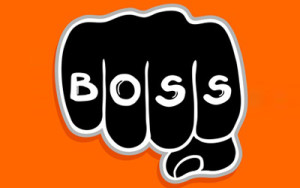 It is not uncommon for people to dislike their boss. Sixty-five percent (survey: Michelle Mcquaid) of people surveyed state they would choose a new boss rather than a promotion or a raise. However, is a new boss the answer? When considering the wish for a new boss it may be wise to recall the brilliant band the WHO’s lyrics “Meet the new boss, same as the old boss”.
It is not uncommon for people to dislike their boss. Sixty-five percent (survey: Michelle Mcquaid) of people surveyed state they would choose a new boss rather than a promotion or a raise. However, is a new boss the answer? When considering the wish for a new boss it may be wise to recall the brilliant band the WHO’s lyrics “Meet the new boss, same as the old boss”.
So if a new boss is not the answer what is one to do? One idea is to be mindful that the worst boss you have may be the boss in your head. This is your internal boss. It includes how you experience and interpret your boss’s actions, criticism or feedback. Familial relationships or past experiences with authority figures can impact your perception of your boss.
Examples of Internal Bosses and How To Manage Them:
Critical Internal Boss: Jim was hypercritical and believed that he was always falling short. When his boss gave him negative feedback Jim amplified it. Situational feedback from his boss regarding a mistake became interpreted that he is always making mistakes. He almost exclusively paid attention to negative feedback and failed to take in positive comments. His internal boss told him he never did anything correctly. Angry about the feedback he was receiving Jim became passive aggressive (ex: late to work) inducing his boss to be even more critical.
Jim benefited by understanding that previous issues with authority figures made him more sensitive to his boss’s feedback. He learned that his internal boss was more critical than his external boss. He also became aware that although his boss was critical at times, he was that way to everyone. Monitoring his tendency to selectively attend to and personalize negative feedback was helpful. Additionally, understanding his internal boss helped him decrease passive aggressive behavior improving his relationship with his external boss.
Neglectful Internal Boss: Mark never received positive feedback from his boss. Mark interpreted this as meaning that his work was not good enough. He perceived he had to be perfect to obtain his boss’s approval. This perception had it’s roots in his family background paralleling his desire to win affection from his distant father. Mark’s internal boss told him he can’t be out sick or miss a deadline. This internal boss drove him to rarely take vacation. When he did go away he could never relax because his internal boss was telling him that he wanted more.
Mark’s understanding that his projections were not fully in reality was a helpful insight. He learned that his boss, although not validating, did not mean he had to be perfect. Learning to be more compassionate towards himself helped him to see his boss as less punitive. Lastly, seeing that he survived taking vacations also debunked previous myths about his external boss’s expectations and changed his internal boss.
Internal Micro-manager: Brian had a boss who in reality was very hands on. Brian was particularly sensitive to this dynamic. This sensitivity came from growing up with a family of helicopter parents who were over-involved. This caused Brian to be prone to irritability around his external boss. Brian’s internal boss and sensitivity to feel suffocated made him extremely frustrated. Learning that his reactions to his current boss were amplified due to his internal boss and his sensitivity to intrusion was helpful.
Please share your own observations and comments about internal bosses. Psychotherapy, Coaching or self-introspection can help you see how your internal boss may be influencing you.

nice